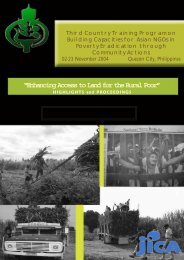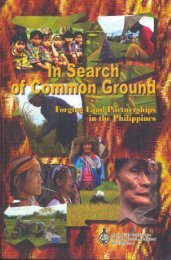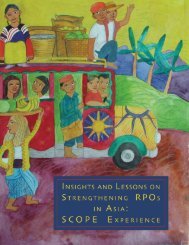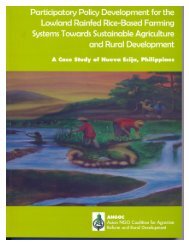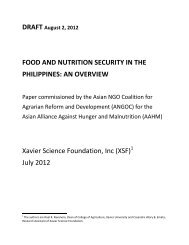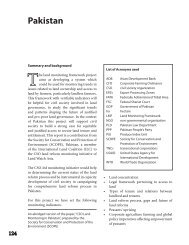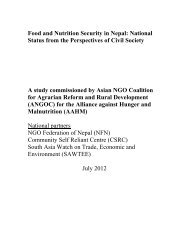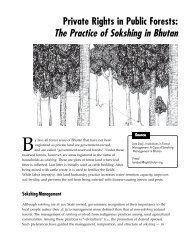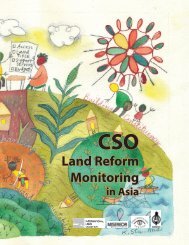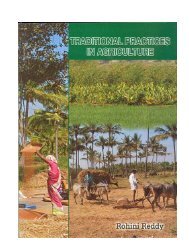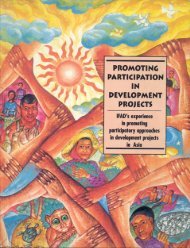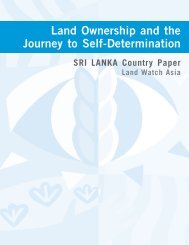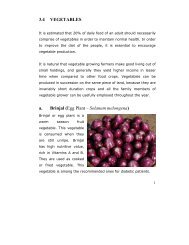Securing the Right to Land FULL - ANGOC
Securing the Right to Land FULL - ANGOC
Securing the Right to Land FULL - ANGOC
You also want an ePaper? Increase the reach of your titles
YUMPU automatically turns print PDFs into web optimized ePapers that Google loves.
land administration, such as <strong>the</strong> computerization of land<br />
records, etc., while steering clear of programs for land acquisition<br />
and distribution.<br />
Overlaps in laws and policies, and in <strong>the</strong> jurisdiction of<br />
government entities that regulate land and resource use.<br />
Conflicts arising from competing land claims result from<br />
overlaps between or among any number of laws or policies;<br />
<strong>the</strong> lack of clear delineation of authority among government<br />
agencies that regulate land and resource use; and<br />
laws or policies that favor certain sec<strong>to</strong>rs over o<strong>the</strong>rs.<br />
Poor implementation of existing laws.<br />
Although <strong>the</strong> legal and institutional frameworks exist<br />
for land reform, <strong>the</strong> reality across countries is that laws<br />
meant <strong>to</strong> enhance access <strong>to</strong> land are poorly implemented.<br />
This is in large part due <strong>to</strong> <strong>the</strong> lack of political will, but also<br />
because of various competing pressures.<br />
Discrimina<strong>to</strong>ry laws and practices.<br />
Governments have tended <strong>to</strong> look <strong>the</strong> o<strong>the</strong>r way in<br />
cases of landgrabbing by moneyed and politically powerful<br />
groups. In o<strong>the</strong>r instances, <strong>the</strong> government itself forcibly<br />
takes land from <strong>the</strong>ir owners “in pursuit of <strong>the</strong> public good.”<br />
More often than not, such incidents of landgrabbing, or<br />
state expropriation of land, are not motivated by <strong>the</strong> public<br />
interest but ra<strong>the</strong>r are <strong>the</strong> inevitable result of government’s<br />
Table 3. Selected Access <strong>to</strong> <strong>Land</strong> Issues in Six Asian Countries<br />
Bangladesh<br />
Highlighted Issues<br />
THE PROLONGED STRUGGLE FOR LAND RIGHTS IN ASIA<br />
23<br />
indiscriminate awarding of land concessions <strong>to</strong> logging<br />
companies, mining opera<strong>to</strong>rs, and plantation companies,<br />
among o<strong>the</strong>rs. Just as frequently, forest-dwelling communities,<br />
particularly indigenous peoples, are divested of <strong>the</strong>ir<br />
landholdings or denied access <strong>to</strong> forest resources. Sometimes,<br />
programs that are, on <strong>the</strong>ir face, well-intentioned,<br />
such as <strong>the</strong> setting up of conservation parks and reserves,<br />
have <strong>the</strong> identical effect of keeping forest/upland communities<br />
out of <strong>the</strong>ir traditional source of livelihood.<br />
Women’s right <strong>to</strong> possess and inherit land is guaranteed<br />
by law in a number of Asian countries, but such laws offer<br />
no protection <strong>to</strong> women against sexual discrimination that<br />
is rooted in tradition and religion. For example, Sharia Law<br />
grants Muslim women limited rights <strong>to</strong> inherit property. In<br />
practice, however, <strong>the</strong> patriarchal nature of Muslim society<br />
prevents women from claiming this limited entitlement. A<br />
woman, being “a good sister,” is expected <strong>to</strong> surrender her<br />
claim <strong>to</strong> paternal property <strong>to</strong> her bro<strong>the</strong>r/s.<br />
Information gaps.<br />
To date, national data on land distribution, land tenure,<br />
and landlessness is missing in several countries or is unreliable.<br />
This becomes a challenge <strong>to</strong> moni<strong>to</strong>ring and evaluating<br />
<strong>the</strong> impact of advocacy on land reform as well as <strong>the</strong><br />
agrarian programs <strong>the</strong>mselves.<br />
Access <strong>to</strong> and distribution of khas land.<br />
Agricultural “khas” (government owned) land covers some 321,323 hectares, of which 139,691 or<br />
43.47% has reportedly been distributed <strong>to</strong> landless households. Government policy states that khas lands<br />
are <strong>to</strong> be distributed <strong>to</strong> landless peasants dependent on agriculture for <strong>the</strong>ir livelihood, but leakage of<br />
khas land has been as much as 17.2%, as indicated by a 2001 report. Khas recipients are supposed <strong>to</strong><br />
pay government a minimal fee of 1 Taka (US $0.01 in 2008 prices) per acre of land received. However,<br />
in practice, <strong>the</strong>y have <strong>to</strong> fork out bribes almost a thousand times more (US $105–150) <strong>to</strong> various officials<br />
even at <strong>the</strong> lowest tiers of government.<br />
Access <strong>to</strong> and distribution of non-agricultural land.<br />
Previously, no guidelines existed for <strong>the</strong> management of non-agricultural land. Influential and wellconnected<br />
persons were thus able <strong>to</strong> claim ownership of non-agricultural land, usually with forged documents.<br />
When <strong>the</strong> government in 1995 issued detailed guidelines for <strong>the</strong> management and settlement of<br />
state land in urban areas, most of such lands had already been awarded <strong>to</strong> <strong>the</strong> rich and powerful.<br />
Absentee landownership.<br />
Around 13% of households own more than half (58%) of <strong>the</strong> country’s land. Many of <strong>the</strong>se households do<br />
not engage in agriculture, but reside and make <strong>the</strong>ir living in urban areas, ei<strong>the</strong>r by running <strong>the</strong>ir own business<br />
or by being employed in <strong>the</strong> government or <strong>the</strong> private sec<strong>to</strong>r. This encourages rent-seeking behavior.<br />
ASIAN NGO COALITION FOR AGRARIAN REFORM AND RURAL DEVELOPMENT



